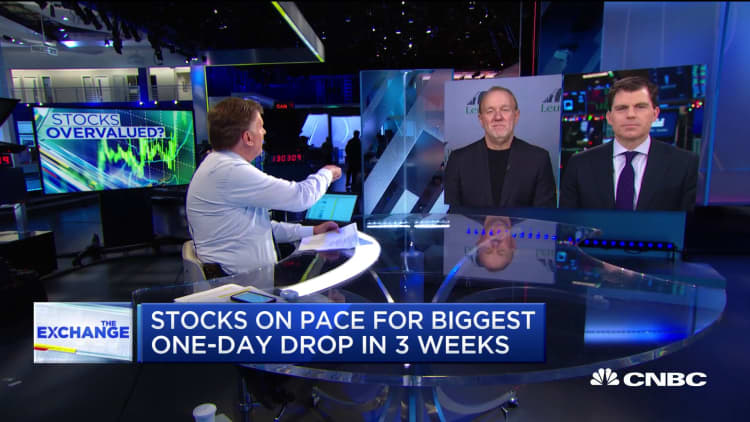The size of the stock market relative to the size of the economy is at its highest level ever, raising concerns that the market's recent all-time highs are detached from reality.
The likes of legendary investors Warren Buffett and Paul Tudor Jones have measured the stock market in this, or similar ways in the past to determine if it is overvalued or undervalued.
While some valuation measures are based on fickle analyst estimates, the equity market cap-to-GDP ratio is based on concrete and simple data. The same goes for Buffett's reportedly preferred gauge, equity market cap-to-gross national product, and the cyclically adjusted price-to-earnings ratio, created by Nobel Prize winner Robert Shiller. CAPE, the ratio of the stock market to historical earnings, is near the highest since the dot-com bubble.

These big picture looks at economic health are basically showing investors are unrealistically valuing future growth.
The equity market cap-to-GDP ratio is at an all-time high, above 200%, Goldman Sachs noted to clients last week. With the S&P 500 up more than 1% in 2020, following a near 30% rally last year, stocks are more expensive by historical standards. The ratio measures the value of all public companies and divides it by U.S. GDP.
The chart is similar to one Buffett said he watches as a key measure of valuation, calling it in a Fortune magazine article in 2001 "probably the best single measure of where valuations stand at any given moment." The Oracle of Omaha said he likes the market cap-to-GNP ratio to be around 70% to 80% — it sits around 187%, by CNBC's calculations.
Hedge fund manager Jones also reportedly watches a variant of the Buffett gauge. In 2017, Jones said the market's value relative to the economy should be "terrifying" to the Janet Yellen-led Federal Reserve due to low interest rates. The Fed later hiked rates three times in 2017, two times after Jones' comments. Ultimately the central bank got the warning and reversed itself, cutting rates three times last year helping the economy to catch up.
Shiller's measure
CAPE is near the highest since the 2000 dot-com bubble, when internet stocks rose and eventually collapsed, shedding nearly 80% of value within seven months. The CAPE ratio is a measure that compares stock valuations from different eras by averaging earnings over 10 years, eliminating some of the short-term volatility of each market cycle.
Currently, CAPE sits around 28, in the 90th percentile, which Shiller called "significant" in a New York Times article this year. To be sure, it was slightly higher in September 2018, a period that preceded a significant market sell-off.
High valuations, low earnings growth
Such remarkable gains in 2019 have left U.S. stocks expensive — in the 10th decile, meaning equities have been cheaper at least 90% of the time.
"Such elevated valuations in past periods have weighed on equity returns over the subsequent five years and lowered the odds of positive outcomes," Goldman Sachs Investment Strategy Group CIO Sharmin Mossavar-Rahmani said in the group's 2020 outlook. "That the bulk of last year's returns came from higher valuations, and not growth in earnings, only compounds investors' concerns."
Low rates make it OK?
Some economists and traders contend low interest rates instituted by central bankers around the world are the cause of the high valuations and maintain they should allow for higher PEs without big cause for concern. However, Shiller noted interest rate levels historically do not correlate with the CAPE ratio.
Stocks continue to climb to record highs and seem to disregard geopolitical pressures. Shiller attributes the gains to "animal spirits," a sense of optimism and inclination toward risk.
"High animal spirits in the stock market are often associated with the disparagement of traditional authority and expert opinion," Shiller wrote, which he said is being inspired by President Donald Trump's "Make America Great Again" narrative.
"The rise of an explicit belief in irrationality like this one is troubling on many levels," Shiller wrote in The New York Times.
To be sure, some investors will argue a shift away from more capital-intensive businesses in the U.S., like railroads, utilities and manufactures, could have contributed to the disconnect between stocks and the economy. Some of the biggest companies in the world were built through the use of very little capital and software, but have led the largest expansion in U.S. history.
— With reporting from CNBC's Nate Rattner and Michael Bloom.


